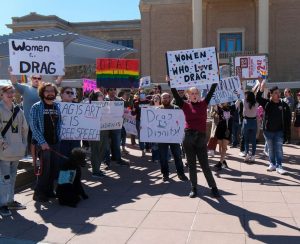True to their objective, in 2016, the Society launched their LGBT+ Lawyers Division, which aims to unite LGBT+ lawyers by sharing best practices, addressing issues and challenges in the LGBT+ legal community and create a platform for gay, lesbian and transgender lawyers to be heard.
We had the opportunity to speak to Katrina Robinson, who is Chair of the Law Society’s LGBT + Division, as well as a solicitor and independent adjudicator. We ask her about how diversity can improve for the LGBT community and what impact the Division has had so far.
So, whilst there is a clear improvement in respect of diversity, firms could do more to evidence inclusion.
What improvements do you think need to be made to ensure better inclusion and diversity in law, especially in relation to the LGBT+ community? What should law firms be doing?
It is clear that a number of firms across the country are embracing diversity and inclusion by putting some great ideas into practice. These include support and social groups, celebration and recognition of days such as LGBT+ History Month and LGBT+ Pride. It is unfortunate, however, that the glass ceiling still exists for LGBT+ solicitors who are openly out, to hold positions of seniority, such as Senior Partner. For gay women, it's known as the double-glazed glass ceiling as they have two barriers to overcome; being female and lesbian. So, whilst there is a clear improvement in respect of diversity, firms could do more to evidence inclusion.
I think many larger firms might be doing more positive work with LGBT+ issues because they feel they should (which is absolutely fine) and many smaller firms perhaps think it is not relevant for them. All firms, regardless of size, should consider supporting LGBT+ organisations in their area and especially local Pride events. This is almost certain to increase positive interest in the firm and a sense of community adhesion, but will also be setting a standard to other firms in the area about the importance of standing by minority groups.
The Division is supported by the Law Society's LGBT+ Committee which comprises solicitors from private practice, Government departments and in-house.
Most LGBT+ solicitors will have a story, or two, about how a client made an inappropriate comment about the LGBT+ community and the firm took no action and the solicitor felt unsupported to deal with it him/herself. There's no need to sack a client for such behaviour, but educating that person is important. Why not invite them to the firm's float at the next Pride event with free cocktails! The most important message for law firms is that solicitors who are happy and supported in their roles will increase profits; if a high performing, high fee earning and popular solicitor leaves as she/he feels their position is untenable because of LGBT+ bias, then profits will be affected.
You mentioned that it has been two years since The Law’s Society LGBT+ Lawyers Division was established; what impact has the Division had so far?
The Division is supported by the Law Society's LGBT+ Committee which comprises solicitors from private practice, Government departments and in-house. Since our inception in 2016, the number of members in the Division has grown steadily and we are now a thriving community and support group. We hold regular events throughout the year including speed networking, panel debates, podcasts and attendance at a number of Pride parades across the country where we join forces with the SRA, Cilex and the Bar to walk together in unity.
We are in the process of planning our work for the next three years and we are focusing on intersectionality, as well as continuing LGBT+ specific events and programmes.
The Division is still in its relative infancy compared to other diversity groups at the Law Society who have been established for a number of years. However, it is very refreshing to hear from members that they feel represented and less isolated and are especially glad that we do hold events outside of London.
Moreover, what changes are you and the Division working towards? What impact will this have?
We are in the process of planning our work for the next three years and we are focusing on intersectionality, as well as continuing LGBT+ specific events and programmes. We work well with the other Law Society Diversity and Inclusion groups and aim to support each other in all that we do, as many solicitors will have more than one 'protected characteristic' and many, if not all firms, will have staff who are diverse outside the LGBT+ realm.
The LGBT+ Division and the other diversity groups in the Law Society are united in promoting the well-being of solicitors and helping them to have successful and happy careers regardless of their characteristics. It also enables firms to support all of their staff and by so doing, improve their reputation and standing in their communities.
We are always there to mentor, advise and support any solicitor who feels isolated to improve their professional life.
What would be your piece of advice for members of the LGBT+ community who may feel isolated in the legal field?
To join us! We are not advocating that every LGBT+ solicitor should come out at work if they felt incredibly uncomfortable doing so, but if they wanted to, then we would support them and their firms all the way. We are always there to mentor, advise and support any solicitor who feels isolated to improve their professional life. We have a specific LinkedIn group (Law Society LGBT+ Lawyers Division) and you can join us through the Communities page on The Law Society website. We would also aim to introduce that person to other LGBT+ solicitors in their area.




















